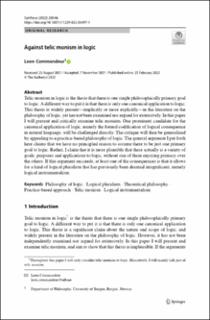Against telic monism in logic
Journal article, Peer reviewed
Published version

Åpne
Permanent lenke
https://hdl.handle.net/11250/3041326Utgivelsesdato
2022Metadata
Vis full innførselSamlinger
- Department of Philosophy [240]
- Registrations from Cristin [9791]
Sammendrag
Telic monism in logic is the thesis that there is one single philosophically primary goal to logic. A different way to put it is that there is only one canonical application to logic. This thesis is widely present—implicitly or more explicitly—in the literature on the philosophy of logic, yet has not been examined nor argued for extensively. In this paper I will present and critically examine telic monism. One prominent candidate for the canonical application of logic, namely the formal codification of logical consequence in natural language, will be challenged directly. The critique will then be generalized by appealing to a practice-based philosophy of logic. The general argument I put forth here claims that we have no principled reason to assume there to be just one primary goal to logic. Rather, I claim that it is more plausible that there actually is a variety of goals, purposes and applications to logic, without one of them enjoying primacy over the others. If this argument succeeds, at least one of the consequences is that it allows for a kind of logical pluralism that has previously been deemed insignificant, namely logical instrumentalism.
